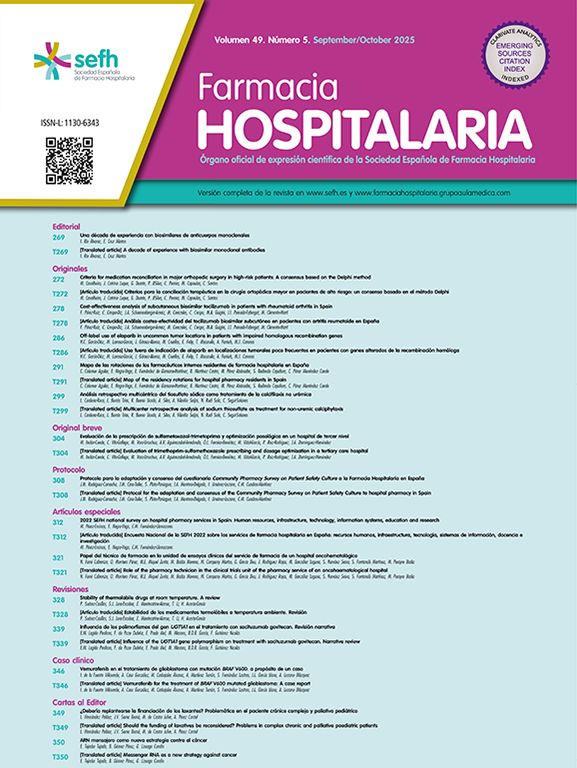To assess a control protocol concerning alterations in metabolic follow-up parameters in the context of a pharmaceutical care program designed for surgical patients receiving parenteral nutrition, through determination of the impact of pharmaceutical interventions on associated metabolic complications.
MethodsProspective interventional study of two-months’ duration performed in surgical patients receiving parenteral nutrition. The study variables included predefined biochemical parameters within the metabolic-nutritional profile. Four categories were established to classify the degree to which each parameter was altered: a) no alteration (within normal range); b) alteration with no associated complication; c) moderate complication, and d) severe complication. The type of pharmaceutical intervention carried out included a direct intervention on their part or a recommendation. Statistical differences between the mean analytical values before and after the intervention were assessed by parametric and non-parametric tests (P<.05).
ResultsA total of 1055 analytical determinations corresponding to 44 patients were evaluated. Among them, 239 determinations (22.6%) presented some degree of alteration which corresponded to 162 complications. Complication is often defined whit more than one parameter. Ninety-three (57.4%) corrective interventions were carried out by direct intervention and 16 (9.9%) by recommendation.
The results showed statistically significant differences or significant trend when the purpose of the pharmaceutical direct intervention was to increase albumin, prealbumin, potassium or phosphate levels or to decrease C-reactive protein, glucose or triglycerides. Significant differences or significant trend were not seen when no intervention was performed.
ConclusionDespite the fact that the parameters assessed may have been influenced by factors other than the parenteral nutrition treatment received, our findings show that systematic monitoring of specific analytic parameters can be effective for attaining success in nutritional therapy, in terms of improvement in nutritional status and prevention and control of associated complications.
Evaluar un protocolo de control de las alteraciones de los parámetros metabólicos en el contexto de un programa de atención farmacéutica dirigido a pacientes quirúrgicos con nutrición parenteral, a través del impacto de las intervenciones farmacéuticas en las complicaciones metabólicas asociadas.
MetodoEstudio prospectivo de intervención de 2 meses de duración. Se estudia a pacientes quirúrgicos con nutrición parenteral. Como variables de estudio se incluyen los parámetros bioquímicos predefinidos en el perfil metabólico-nutricional. Se establecen 4 categorías para clasificar el grado de alteración de cada parámetro: a) sin complicación; b) alteración no asociada con complicación; c) complicación moderada, y d) complicación grave. El tipo de intervención del farmacéutico se realiza mediante intervención directa o consejo. Las diferencias estadísticamente significativas entre los valores medios de los valores de los parámetros analíticos previos y posteriores a la intervención farmacéutica se establecen con pruebas paramétricas y no paramétrica (p<0,05).
ResultadosSe evaluaron 1055 parámetros correspondientes a 44 pacientes. En total, 239 (22,6%) presentaron alteración, lo que correspondió a 162 complicaciones (para definir algunas complicaciones se utiliza más de un parámetro), de las cuales 93 (57,4%) se intentaron corregir mediante intervención directa y 16 (9,9%), mediante consejo. Los resultados mostraron diferencias estadísticamente significativas o una tendencia hacia la significación cuando el objetivo de la intervención directa fue incrementar la albúmina, la prealbúmina, el potasio y el fosfato, y disminuir la PCR, la glucosa y los triglicéridos. Cuando no se realizó ninguna intervención no se encontraron diferencias significativas o con tendencia hacia la significación.
ConclusionesA pesar de que los parámetros evaluados pueden estar influidos por otros factores ajenos al tratamiento con nutrición parenteral, los resultados de este estudio indican que el seguimiento sistemático de éstos puede ser un método eficaz para conseguir el éxito de la terapia nutricional, tanto en la mejora del estado nutricional como en la prevención y el control de las complicaciones asociadas.
This study was previously presented on a research poster in the 35th European Symposium on Clinical Pharmacy (Vienna, October 2006).





